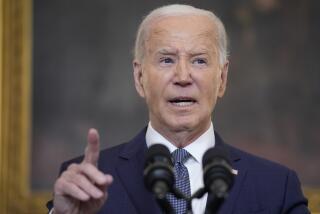On Peace Talks Issue, Israel Puts Ball in Arabs’ Court : Mideast: By accepting a proposal for a regional conference, the Shamir government shifts the spotlight to the other side.
- Share via
JERUSALEM — By accepting a proposal for a regional Israeli-Arab conference, the government of Prime Minister Yitzhak Shamir succeeded in ending a long and embarrassing period when it was asked to deliver on peace moves and stalled. The spotlight has shifted instead to Arab allies of the United States who are being asked to meet with the Jewish state they have long rejected.
The turnabout was accomplished by the abandonment of the 1989 Israeli election plan for Palestinians. Shamir had refused to speak to the Palestinians, something necessary in order to put the plan into effect.
Shamir had complained that another part of his 1989 proposal--talks with Arab states--was ignored by Washington. Almost two years later, in the new plan outlined during the visit this week by Secretary of State James A. Baker III, Saudi Arabia, the Persian Gulf emirates, Syria and probably Jordan are being asked to sit down with Israel. Palestinian-Israeli talks are on a “second track” that is intertwined with the first.
In the view of the Shamir government, Arab states must make some definitive move. “It takes two to tango,” said Shamir’s spokesman, Avi Pazner. “It isn’t enough for Israel and the United States to agree. The ball is in the Arab court.”
Harry Wall, director of the Anti-Defamation League here, remarked: “It was sensible for Israel to sign on and then wait and see what the Arabs do rather than the other way around, with everyone waiting to see what Israel would do.”
Whether the Arab states are ready to enter talks with Israel is far from clear, particularly since Shamir has already set special limits on the discussions. He has refused to commit himself to a framework that would pledge an Israeli withdrawal from the occupied West Bank and Gaza Strip and annexed Arab neighborhoods of Jerusalem.
On Wednesday, hours before Baker was scheduled to arrive in Cairo, Egypt’s Foreign Minister Esmat Abdel Meguid laid out the choice starkly: “There can be no peace as long as Israel is occupying Arab land.”
“You see, if the Arab states refuse to go along, they will be blamed, and that suits Shamir,” said Arye Naor, a political commentator and former senior official in the government of Menachem Begin.
After Baker’s arrival, Egypt gave general approval to the peace conference, and Meguid tempered his position somewhat, suggesting that Egypt is “open to discuss any way to find a peaceful solution.” But if the Arabs bounce the land issue back to Israel, there are numerous domestic pitfalls in Israel’s tangle of politics that could eventually subvert the effort--even if Shamir wanted to go ahead. Ideologues to his right view any negotiations with suspicion and are pressing Shamir to annex at least part of the land in order to ensure that Israel never has to let go.
Housing Minister Ariel Sharon, an annexation advocate, struck back at Shamir for branding him the villain in the continuing effort by the government to speed up settlement of the West Bank and Gaza. Sharon pointed out that settlements underpin the program of the rightist coalition that rules Israel.
Splinter parties that make up part of Shamir’s ruling majority have already threatened to bolt if Israel sits down with Palestinians. New elections would at least delay getting the regional conference off the ground.
The main allure for Israel is the chance to get previously hostile Arab states to sit down and meet face to face with the Jewish state, thereby gaining implicit recognition. Whether that is enough to pry the West Bank and Gaza away is another matter.
“Even Shamir might have to accept it. It is his own proposal, after all,” Naor commented dryly.
In contrast, Palestinians view with distress the complications of a regional conference.
After a meeting with Baker, local Palestinian leader Faisal Husseini told reporters, “We don’t much like this idea.”
Later, he said that Baker had described the goal of talks as less than independence for Palestinians and gave the Palestinians choices on representation at a peace conference. Among the options were a delegation strictly from the West Bank and Gaza--Husseini himself is from Jerusalem--or a joint team with Jordan.
More to Read
Sign up for Essential California
The most important California stories and recommendations in your inbox every morning.
You may occasionally receive promotional content from the Los Angeles Times.










